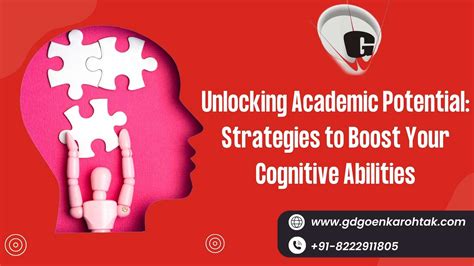Introduction
In today’s fast-paced world, intelligence is indispensable. It empowers us to solve problems, make informed decisions, and navigate the complexities of modern society. While some may claim that intelligence is innate and unchangeable, research suggests that we can significantly enhance our cognitive abilities through intentional practice and targeted interventions.

Cognitive Enhancement: Strategies for Success
Brain Training: Exercising Your Mental Muscles
Cognitive training programs, such as Lumosity and CogniFit, offer engaging exercises designed to improve memory, attention, and problem-solving skills. Studies have shown that regular brain training can lead to measurable improvements in cognitive performance, particularly in older adults and individuals with cognitive impairments.
Sleep Optimization: Restoring Your Brain’s Energy
Sleep plays a crucial role in cognitive functioning. When we sleep, our brains consolidate memories, eliminate toxins, and repair damaged neurons. Aim for 7-9 hours of quality sleep each night to optimize your brain’s performance.
Nutrition for the Mind: Fueling Your Cognitive Engine
A nutritious diet provides the essential nutrients that your brain needs to function optimally. Omega-3 fatty acids, found in fish, walnuts, and flaxseeds, have been linked to improved cognitive health. Antioxidants, such as those found in fruits and vegetables, protect brain cells from damage.
Creating a Cognitive Lifestyle
Exercise: Boosting Blood Flow to the Brain
Regular exercise increases blood flow to the brain, delivering oxygen and nutrients that enhance cognitive function. Aerobic activities, such as running, cycling, or dancing, have been shown to improve memory and attention.
Challenge Yourself: Pushing Your Cognitive Boundaries
Seek out activities that challenge your cognitive abilities and force you to think critically. Engage in puzzles, play strategy games, or learn a new language. Challenging yourself stimulates the growth of new neural connections and improves cognitive flexibility.
Surround Yourself with Smart People: Inspiring Cognitive Excellence
Spend time with individuals who value intelligence and engage in stimulating conversations. Surround yourself with people who challenge your perspectives, provide fresh ideas, and inspire you to think deeper.
Tips for Smart Living
Time Management: Prioritizing Your Cognitive Resources
Plan your day effectively to avoid cognitive overload. Prioritize tasks based on their importance and complexity. Break down large tasks into smaller, manageable steps to improve focus and reduce stress.
Mindful Meditation: Calming the Cognitive Chatter
Mindful meditation practices, such as mindfulness-based stress reduction (MBSR) and transcendental meditation (TM), have been shown to reduce stress, improve focus, and enhance cognitive clarity. Set aside a few minutes each day for mindful meditation to cultivate a sense of calm and enhance your cognitive performance.
Continuous Learning: Expanding Your Cognitive Horizons
Embrace a lifelong learning mindset and continuously seek out new knowledge and skills. Attend workshops, read books, and engage in online courses that challenge your intellect and expand your cognitive abilities.
Frequently Asked Questions
1. Can intelligence be measured?
Yes, intelligence can be measured using standardized IQ tests. However, intelligence is a multifaceted construct, and IQ scores only capture a limited aspect of one’s cognitive abilities.
2. Is it possible to increase my intelligence?
Yes, research suggests that intelligence is not fixed and can be enhanced through cognitive training, lifestyle modifications, and targeted interventions.
3. How long does it take to see results from cognitive training?
Results from cognitive training vary depending on the individual and the specific program used. However, most studies indicate that significant improvements can be seen after several weeks of regular training.
4. Can meditation improve my cognitive abilities?
Yes, meditation practices have been shown to enhance focus, reduce stress, and improve cognitive clarity. Regular meditation can lead to increased cognitive flexibility and improved problem-solving skills.
5. Is there a specific diet that supports cognitive health?
A balanced diet rich in fruits, vegetables, lean protein, and omega-3 fatty acids can support optimal cognitive functioning. Avoid processed foods, sugary drinks, and excessive amounts of saturated fats, which have been linked to cognitive decline.
6. How does exercise benefit my brain?
Exercise increases blood flow to the brain, delivering oxygen and nutrients that enhance cognitive function. Aerobic activities have been shown to improve memory, attention, and overall cognitive performance.
Tables of Cognitive Enhancement
Table 1: Brain Training Programs
| Program | Features | Benefits |
|---|---|---|
| Lumosity | Memory, attention, problem-solving exercises | Improved cognitive performance, reduced cognitive decline |
| CogniFit | Personalized brain training programs | Enhanced memory, attention, processing speed |
| Elevate | Adaptive learning platform | Improved vocabulary, reading comprehension, arithmetic skills |
Table 2: Nutrition for Cognitive Health
| Nutrient | Food Sources | Benefits |
|---|---|---|
| Omega-3 fatty acids | Fish, walnuts, flaxseeds | Reduced risk of cognitive decline, improved memory and attention |
| Antioxidants | Fruits, vegetables | Protect brain cells from damage, enhance cognitive function |
| Choline | Eggs, soybeans, broccoli | Essential for memory and learning, supports neurotransmitter production |
Table 3: Activities for Cognitive Challenge
| Activity | Benefits |
|---|---|
| Puzzles | Improve problem-solving skills, enhance cognitive flexibility |
| Strategy games | Develop critical thinking, improve decision-making abilities |
| Learning a new language | Stimulates brain plasticity, enhances cognitive reserve |
Table 4: Tips for Smart Living
| Tip | Benefits |
|---|---|
| Prioritize tasks | Reduce cognitive overload, improve focus |
| Practice mindful meditation | Calm the mind, enhance cognitive clarity |
| Embrace lifelong learning | Expand knowledge, stimulate cognitive growth |
